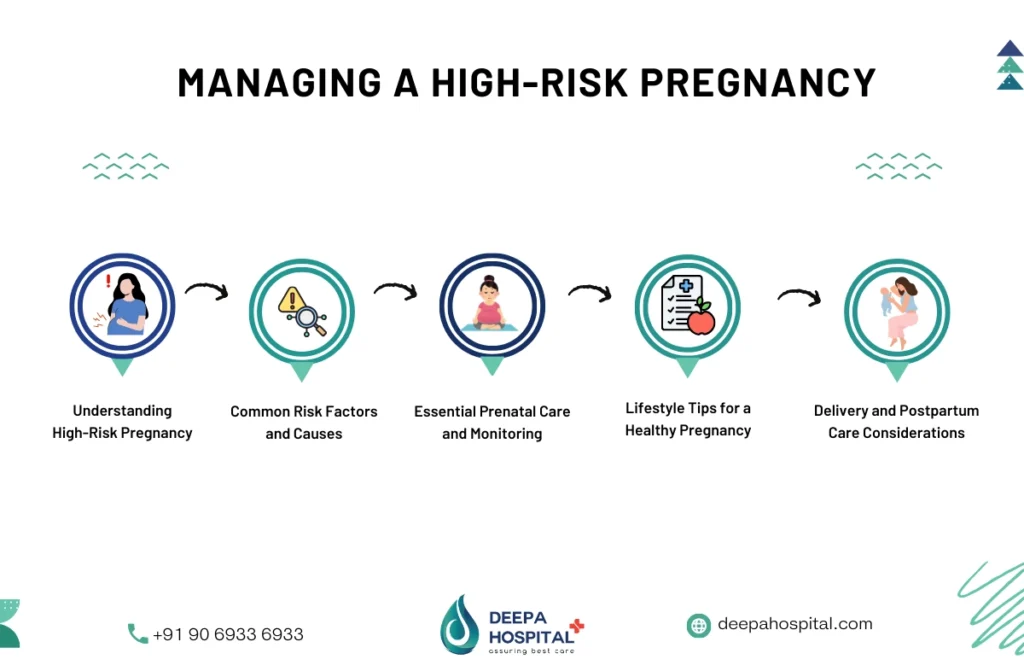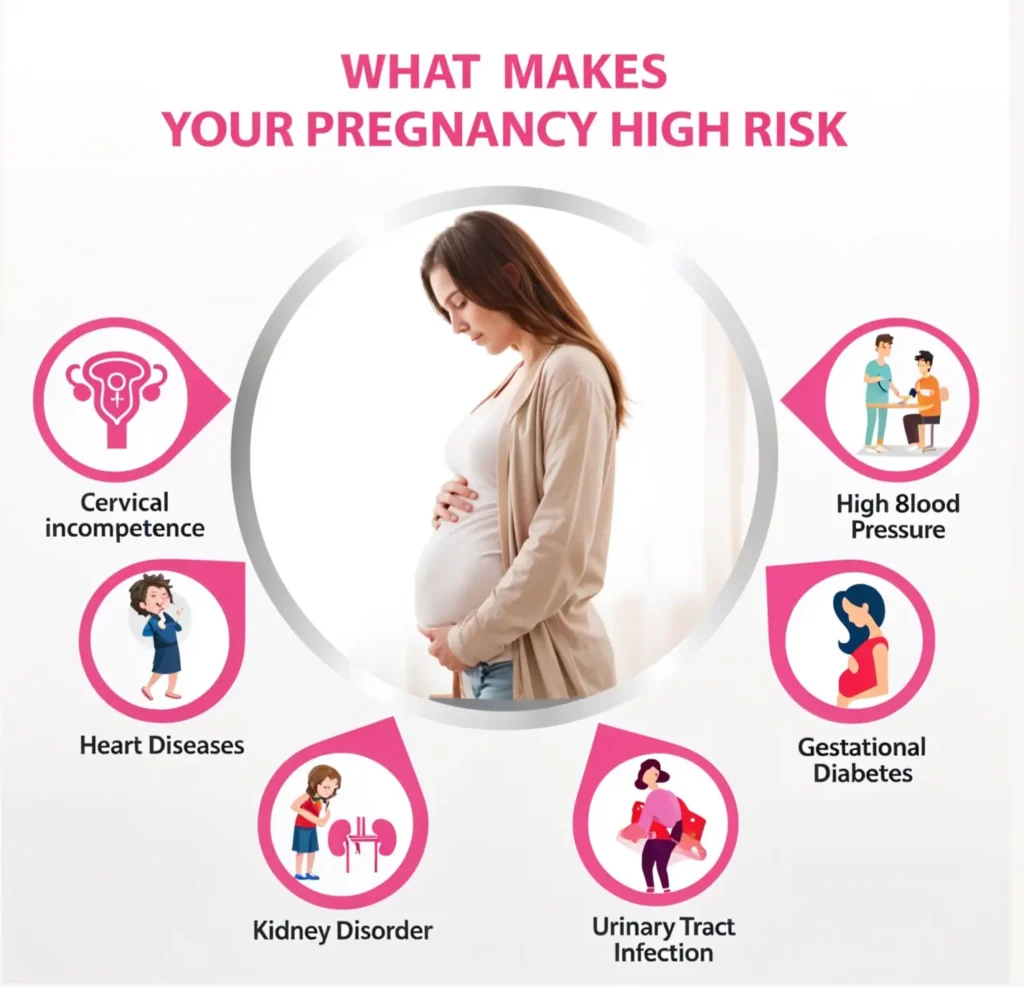Pregnancy is a remarkable journey, but for some women, it comes with added challenges. High-risk pregnancy symptoms can signal the need for closer care and monitoring to ensure the health and safety of both the mother and baby. At Deepa Hospitals, we specialize in guiding expectant mothers through these challenging situations with expertise and compassion. If you’re wondering about high-risk pregnancy symptoms, how to handle them, and what they mean for you, this guide is for you.
What is a High-Risk Pregnancy?
A high-risk pregnancy is one where the health of the mother, baby, or both is at greater risk than usual. This could be due to pre-existing health conditions, complications during pregnancy, or external factors. It’s crucial to recognize high-risk pregnancy symptoms early to manage potential risks effectively.
- Pre-existing Conditions: Chronic issues like diabetes, high blood pressure, or heart disease can make pregnancy high-risk.
- Pregnancy Complications: Conditions like preeclampsia or gestational diabetes arise during pregnancy, adding to the risks.
- Multiple Pregnancies: Carrying twins or more can lead to additional strain on the body.
Early diagnosis and care can make a significant difference, ensuring a smoother pregnancy journey.
What Causes High-Risk Pregnancy?
Understanding what causes high-risk pregnancy? is the first step toward effective management. Multiple factors can contribute, and it’s essential to be aware of them:
- Advanced Maternal Age: Women over 35 are more likely to face complications during pregnancy.
- Previous Pregnancy Issues: A history of miscarriage, preterm labor, or cesarean delivery increases risks.
- Lifestyle Choices: Smoking, excessive alcohol consumption, or drug use can harm both mother and baby.
- Underlying Medical Conditions: Health issues like thyroid disorders or autoimmune diseases impact pregnancy outcomes.
By addressing these causes early, Deepa Hospitals ensures personalized care tailored to your unique needs. Knowing what causes high-risk pregnancy? empowers mothers-to-be to take proactive steps.

What Qualifies a Pregnancy as High-Risk?
A pregnancy is classified as high-risk when conditions arise that might harm the mother or baby. High-risk pregnancy symptoms such as severe swelling, extreme fatigue, or reduced fetal movements are red flags. Doctors use these indicators, alongside tests and medical history, to evaluate risk levels. At Deepa Hospitals, our specialists offer comprehensive evaluations to determine if a pregnancy falls into this category.
What Factors Make a Pregnancy High-Risk?
- Maternal Age: Young mothers (under 17) or older mothers (over 35) face higher risks.
- Multiple Pregnancies: Carrying more than one baby increases the chance of preterm birth.
- Obesity or Low Weight: Both conditions can lead to complications like gestational diabetes or preterm labor.
- Infections: Certain infections, like Zika virus or rubella, can affect pregnancy outcomes.
- Pre-Existing Medical Conditions: Chronic illnesses such as hypertension, diabetes, or autoimmune disorders can make a pregnancy high-risk.
- Previous Pregnancy Complications: A history of miscarriage, preterm labor, or preeclampsia increases risk factors.
Recognizing high-risk pregnancy symptoms can help expectant mothers take preventive steps and work closely with healthcare providers to ensure a safe and healthy pregnancy.

What are the Signs and Symptoms of High-Risk Pregnancy?
Knowing high-risk pregnancy symptoms is essential for timely action. Here are some common symptoms to watch for:
- Severe Nausea and Vomiting: This could signal hyperemesis gravidarum, leading to dehydration.
- Severe Headaches or Vision Changes: These could indicate high blood pressure or preeclampsia.
- Unusual Swelling: Significant swelling in the hands, feet, or face can be a sign of trouble.
- Reduced Fetal Movement: A noticeable decrease in the baby’s activity may require immediate attention.
- Vaginal Bleeding: Spotting or heavy bleeding should never be ignored.
If you experience any of these symptoms, contact your doctor or visit Deepa Hospitals for expert care.
How is High-Risk Pregnancy Diagnosed and Monitored?
Diagnosing and monitoring a high-risk pregnancy involves a combination of tools and techniques:
- Regular Ultrasounds: To track fetal development and check for complications.
- Blood Tests: To monitor for gestational diabetes, infections, or other issues.
- Non-Stress Tests: To ensure the baby’s heart rate is normal.
- Specialist Consultations: At Deepa Hospitals, our experts provide personalized care plans for high-risk pregnancies.
How to Handle a High-Risk Pregnancy?
Handling a high-risk pregnancy requires a mix of medical care and lifestyle adjustments. Here’s what you can do:
- Follow Medical Advice: Stick to the treatment plan provided by your doctor.
- Attend All Appointments: Regular check-ups are vital to monitor your health and the baby’s development.
- Adopt a Healthy Diet: Eat balanced meals rich in vitamins, minerals, and proteins.
- Get Adequate Rest: Prioritize sleep and relaxation to reduce stress.
Deepa Hospitals provides the necessary support and guidance to ensure you’re not navigating this journey alone. Understanding how to handle a high-risk pregnancy? can make the process more manageable and less stressful.
What is the Treatment for a High-Risk Pregnancy?
Treatment depends on the underlying cause of the high-risk pregnancy. Some common approaches include:
- Medication: To manage conditions like high blood pressure or gestational diabetes.
- Bed Rest: Prescribed for conditions like preeclampsia or preterm labor.
- Close Monitoring: Regular scans and tests to track progress.
- Specialized Delivery Plans: Planning for a cesarean or early delivery if needed.
At Deepa Hospitals, our team designs a treatment plan tailored to your specific needs, ensuring the best outcomes. Knowing how to handle a high-risk pregnancy? and having a treatment plan in place can significantly reduce complications.
Diagnosis and Tests
Diagnosing a high-risk pregnancy involves regular screenings, ultrasounds, and medical evaluations. These tests help monitor fetal development and maternal health to detect potential issues early.
Essential Tests for High-Risk Pregnancy:
- Blood Tests: Checks for infections, anemia, and genetic disorders.
- Ultrasound Scans: Monitors fetal growth and detects abnormalities.
- Glucose Tolerance Test: Identifies gestational diabetes.
- Amniocentesis: Examines chromosomal conditions in the baby.
- Non-Stress Test (NST): Assesses fetal heart rate and movement.
- Biophysical Profile (BPP): Measures fetal well-being.
Regular prenatal care is essential to manage high-risk pregnancy symptoms effectively.
At What Age is Pregnancy High-Risk?
One of the most common questions is, at what age is pregnancy high-risk? The answer lies in both extremes:
- Under 17 Years: Young mothers may face complications like anemia or preterm labor.
- Over 35 Years: Advanced maternal age increases risks of conditions like gestational diabetes or chromosomal abnormalities.
If you fall into these age groups, it doesn’t mean you can’t have a healthy pregnancy. With proper care, including guidance from Deepa Hospitals, risks can be managed effectively. Knowing at what age is pregnancy high-risk? empowers women to prepare for a safe pregnancy.
How Can I Prevent a High-Risk Pregnancy?
While some risks can’t be avoided, there are steps you can take to reduce the likelihood of complications:
- Maintain a Healthy Weight: Aim for a balanced diet and moderate exercise before and during pregnancy.
- Quit Smoking and Alcohol: These habits can harm both you and your baby.
- Manage Chronic Conditions: Control issues like diabetes or hypertension before conceiving.
- Get Regular Prenatal Care: Early and consistent care is vital for catching issues before they escalate.
Deepa Hospitals emphasizes prevention and early intervention as keys to a healthy pregnancy journey. Understanding what causes high-risk pregnancy? and taking preventive measures can lead to better outcomes.
Signs of a High-Risk Pregnancy
Identifying the early signs of a high-risk pregnancy is essential to ensure the safety of both mother and baby.
- Severe Abdominal Pain or Heavy Bleeding
Constant abdominal pain or significant vaginal bleeding can indicate serious conditions like ectopic pregnancy, placental issues, or miscarriage. These symptoms need urgent medical attention to prevent complications. - High Blood Pressure and Swelling
Elevated blood pressure with swelling in the hands, face, or legs may signal preeclampsia. If untreated, this can lead to seizures or organ failure and requires close monitoring. - Reduced Fetal Movements
A drop in baby’s movements after 28 weeks may indicate distress. Monitoring fetal kicks and reporting any decrease helps in early detection of complications. - Severe Headaches with Vision Problems
Intense headaches with blurred vision or light sensitivity can point to high blood pressure or neurological concerns, which need immediate evaluation.
By recognizing these signs early, expecting mothers can receive proper care to reduce risk and protect their pregnancy journey.
Conclusion
High-risk pregnancy symptoms may sound overwhelming, but with proper care and attention, a healthy pregnancy and delivery are possible. At Deepa Hospitals, we’re committed to supporting mothers through every step of their journey.

